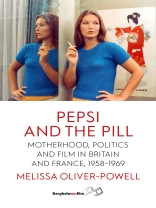The 1960s was a decade of massive political and cultural change in Western Europe, as seismic shifts took place in in attitudes towards sexuality, gender, and motherhood in everyday life. Through case studies of British and French films, Pepsi and the Pill offers a fresh vision of a pivotal moment in European culture, exploring the many ways in which political activity and celebrated film movements mutually shaped each other in their views on gender, sexuality, and domesticity. As the specter of popular nationalism once again looms across Europe, this book offers a timely account of the legacy of crucial debates over issues including reproductive rights, migration, and reproductive nationalism at the intersection of political discourse, protest, and film.
Tabella dei contenuti
Acknowledgements
Introduction: Generation Pepsi
Part I: ‘Conception’
Chapter 1. Maternal Products and the British Kitchen Sink
Chapter 2. The Mass-Reproduction of Mothering: Une Femme Mariée and Le Bonheur
Part II: ‘Gestation’
Chapter 3. The ‘Permissive’ Myth: Conservatism, Change, and Contraception in Swinging London
Chapter 4. Scene and Unscene: Reimagining Abortion in La Génération Pepsi
Part III: ‘Delivery’
Chapter 5. Whose Lineage is it Anyway? Migration and Racist Futurities
Chapter 6. Queer Communities and Queer Failures in British Film
Conclusion: Reproducing the Future
Bibliography
Filmography
Circa l’autore
Melissa Oliver-Powell is a lecturer in Film and Literature in the Department of English and Related Literature at the University of York. She has previously lectured at the University of Exeter, and taught within film, literature and gender studies at UCL, where she received her Ph D in 2018.












